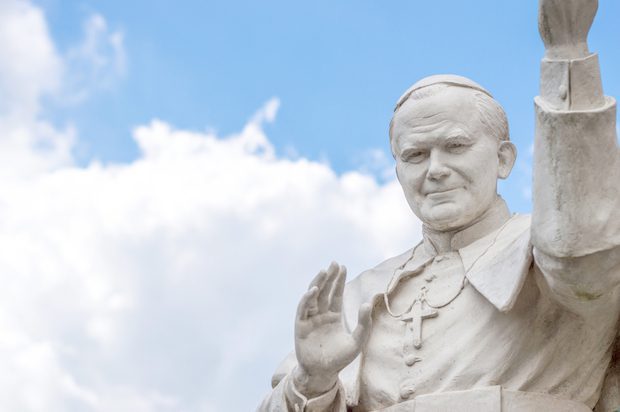Faith & Reason Vs. Mush

Discouraged by Cardinal Cupich’s relativistic “new paradigm” speech? Read Archbishop Charles Chaput’s muscular defense of Pope John Paul II’s 1998 encylical Fides et Ratio, which is, obviously, about the connection between faith and truth. Excerpts:
Finally, without vigorous philosophy, theology and the very life of the Church risk slipping into emotivism. In the name of being pastoral, the Church threatens to become merely indulgent, malleable, affective, and practical; in effect, anti-intellectual. This is exactly the wrong moment for that kind of mistake.
We live in a time when Christian truth is increasingly misunderstood, disdained, or simply unknown, even among baptized Catholics. Michael Polanyi would have recognized our culture’s contradictions, and its emerging shape. It’s a mix of “fierce moral scepticism [paradoxically] fired by moral indignation. Its structure is exactly the same as that of the moral inversion underlying modern totalitarianism”—a contempt for traditional morality, fused with and fueled by ferocious moralizing for social change. Rational consistency is irrelevant. Passion becomes its own justification.
At a more immediate level, the pastor of a local church must meet his people in their hearts and real lives, but also in their minds. We’re beings made for the truth. Thus a clear, appealing presentation of the faith plays a vital role in forming Christians. As a bishop, I sometimes hear from parishioners that one of their concerns with some priests has to do with the content of the homilies they hear each week. They’re happy with calls for kindness or generosity, but they also hunger for homilies that present the substance of the faith, its mysteries and doctrines, in ways that are accessible and attractive. That kind of homily isn’t easy to do. But it’s impossible to do if we don’t have a credible theology, one informed by the strong philosophical traditions of learning that are at the heart of the Church and her patrimony.
More:
Writing in the wake of Vatican II, the Italian Catholic philosopher Augusto Del Noce made three simple observations. First, our era is a “peculiar combination of the greatest perfection of means with the greatest confusion about goals.” Second, in the face of modern atheism—often less a hatred of God than a technology-driven indifference to him—“for a large part of today’s religious thought, the quest for aggiornamento simply means surrendering to the adversary.” And third, much of what styles itself as Christian progressivism, no matter how good its intentions, serves as the instrument of that surrender.
For Del Noce, the Church’s mission in every era is to bring the world into line with eternal principles while respecting the good in those things which are new. Much of progressive thought does the “exact inverse, since [it seeks] to bring Catholicism into line with the modern world.” By stressing action over contemplation and politics over metaphysics, progressivism reduces the supernatural core of Christian faith to a system of social ethics—a kind of baptized, humanitarian chaplaincy to a world that doesn’t need or want it. The result is obvious. The proof, for Del Noce, would be the hollowed-out national churches that now mark much of northern Europe.
A truly great Catholic intellect, in contrast, speaks from the heart of the Church because he or she is both a rigorous thinker and deeply attuned to the Word made flesh, wisdom incarnate. The confusion that dogged the Catholic world in the years immediately after Vatican II emerged in part from the absence of that kind of rigorous intellect fused with a deep and sincere faith. John Paul did much to heal the confusion. But it has never entirely disappeared, and it’s alive in our own day with new force. This is why the substance of Fides et Ratio is so important—not just for scholars, but also for everyday Christians who turn to the Church for guidance and a path to eternal life.
Read the whole thing. And read it in conjunction with the Cupich address. There is a titanic intellectual and spiritual struggle going on in the Catholic Church today. Whether or not you are a Catholic, and especially if you live in the West, this matters. A lot.
Subscribe for as little as $5/mo to start commenting on Rod’s blog.